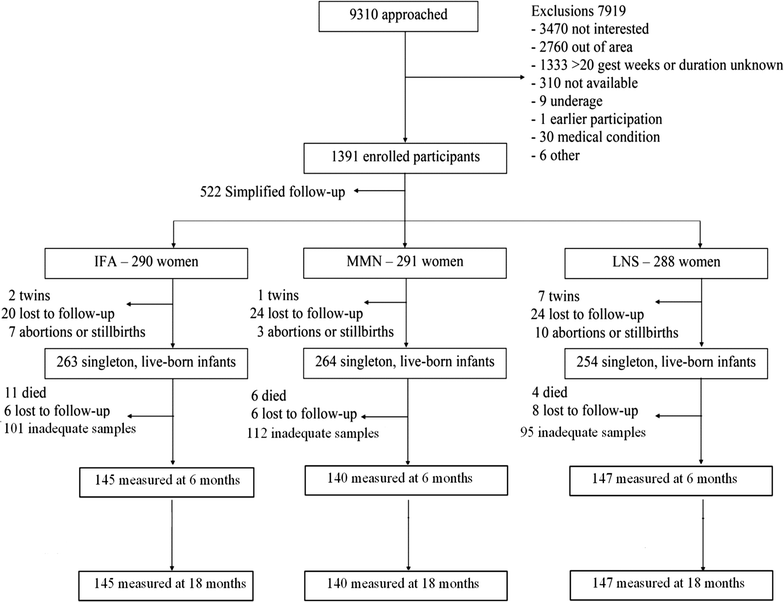Effect of nutrient supplementation on the acquisition of humoral immunity to Plasmodium falciparum in young Malawian children
- PMID: 29415730
- PMCID: PMC5804088
- DOI: 10.1186/s12936-018-2224-6
Effect of nutrient supplementation on the acquisition of humoral immunity to Plasmodium falciparum in young Malawian children
Abstract
Background: There is evidence that suggests that undernutrition has a detrimental effect on malarial immunity in children. The aim of the study was to discover whether nutrient supplementation improved development of malarial antibody immunity in children up to 18 months of age.
Methods: The study was conducted with a subset of 432 Malawian children from a randomized controlled trial of nutritional supplements. The arms included pre- and postnatal small-quantity lipid-based nutrient supplements for both mother and child; prenatal supplementation with iron and folic acid; and pre- and postnatal supplementation with multiple micronutrients. Paired plasma samples were collected at 6 and 18 months of age. The levels of antibodies against merozoite surface protein 1 (MSP1 19kD) and MSP2, erythrocyte binding antigen 175 (EBA175), reticulocyte binding protein homologue 2A (Rh2A9), schizont extract and variant antigens expressed on the surface of infected erythrocytes were measured.
Results: At 18 months of age, 5.4% of children were parasitaemic by microscopy and 49.1% were anaemic. Antibodies to the tested merozoite antigens and schizont extract increased between 6 and 18 months and this increase was statistically significant for MSP1, MSP2 and EBA175 (p < 0.0001) whereas IgG to variant surface antigens decreased with increasing age (p < 0.0001). However, the supplementation type did not have any impact on the prevalence or levels of antibodies at either 6 or 18 months of age to any of the tested malaria antigens in either univariate analysis or multivariate analysis after adjusting for covariates.
Conclusions: Pre- and postnatal lipid-based nutrient supplementation did not alter malaria antibody acquisition during infancy, compared to prenatal supplementation with iron and folic acid or pre- and postnatal supplementation with multiple micronutrients. Trail registeration Clinicaltrials.gov registration number NCT01239693.
Keywords: Malarial immunity in children; Merozoite antigens; Nutrient supplements; Randomized controlled trial; Seroprevalence; Variant surface antigens.
Figures
References
-
- WHO . World malaria report, 2015. Geneva: World Health Organization; 2015.
-
- Friedman JF, Kwena AM, Mrel LB, Kariuki SK, Terlouw DJ, Phillips-Howard PA, et al. Malaria and nutritional status among pre-school children: results from cross-sectional surveys in western Kenya. Am J Trop Med Hyg. 2005;73:698–704. - PubMed
Publication types
MeSH terms
Substances
Associated data
Grants and funding
LinkOut - more resources
Full Text Sources
Other Literature Sources
Medical
Research Materials


